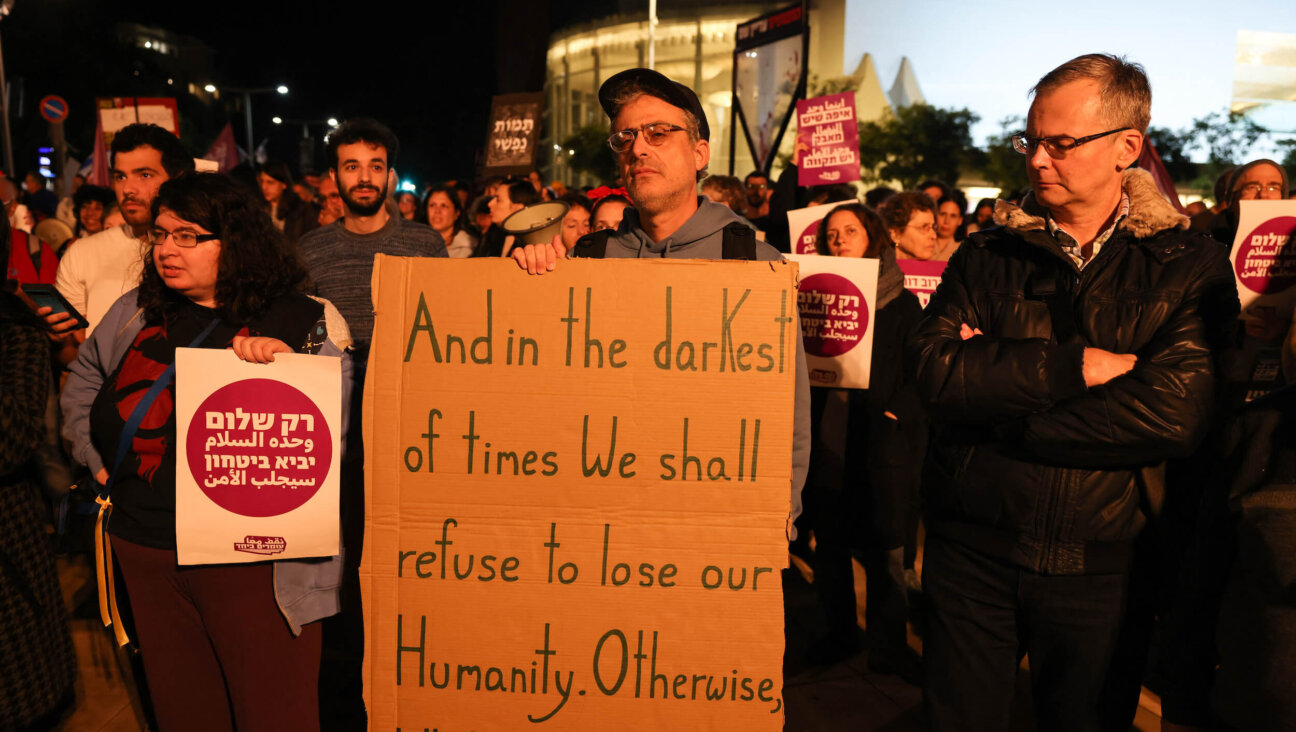Mostly ignored, Jews of color turn to special fund for COVID relief

Graphic by Angelie Zaslavsky
Editor’s note: In observance of Martin Luther King Jr. Day, the Forward is resurfacing some of our recent coverage related to the Black-Jewish experience and racial justice. This article originally appeared in August, 2020.
Some are trans Jews of color on the brink of homelessness. One is an African-American man who worked at a Jewish restaurant for decades and was furloughed. Others have had to decide which meals to skip so family members can eat.
These are some of the beneficiaries of the Jews of Color Initiative’s COVID-19 Emergency Relief Fund for Individuals, a cash assistance program designed to help Jews of color and non-Jewish people of color who work at Jewish institutions who are struggling with rent, food, medical and transportation costs.
As the coronavirus pandemic continues to affect people of color, especially Black and Latino Americans, at disproportionately high rates, so, too has its financial fallout. People of color have been hit harder by unemployment, are more likely to be essential workers working longer hours for less pay, have fewer sick days and are less likely to have cash reserves, according to the Economic Policy Institute. And the strain is showing in the Jewish community, too, with Jews of color seeking out financial assistance through this initiative and others.
While the fund couldn’t make grantees available for comment due to issues of anonymity, other Jews of color report feeling alienated by majority-white institutions as members at synagogues and describe instances of being passed on for project funding.
“The community needed a racially sensitive and inclusive COVID-19 fund,” said Ilana Kaufman, executive director of the Jews of Color Initiative, in an email, “so we created one.”
How can we raise money for causes we believe in? Philanthropist Lisa Greer, author of the just-released “Philanthropy Revolution: How to inspire donors, build relationships, and make a difference” (Harper Collins) joins Forward National Editor Rob Eshman and Andres Spokoiny, President and CEO of Jewish Funders Network on Monday, August 31 at 8 p.m. ET/5 p.m. Pacific. Register here.
The fund has received a total of $150,000 in donations, about $120,000 of which has been disseminated to around 70 households, said Kaufman. While the application is temporarily closed as staff process applications and do some fund management, the grants have so far ranged from $250 to $2,500 each.
The large majority of grantees are Jews of Color, who the Initiative estimates make up between 12% and 15% of the American Jewish population, while about 20% are people of color working in Jewish institutions, she said. Many applications come from the Los Angeles area, the New York City area and Madison, Wisc., but the fund has also received applications from San Francisco, Chicago, Portland, Or. and Dallas, among other locations.
While there are multiple COVID-19 relief funds available to Jews, many of the organizations funding them have majority white boards, white staffers and white application review committees, which can create a perceived power imbalance for Jews of color seeking assistance, keep Jews of color from hearing about funds and lead to a lack of shared experience that might make financial need difficult to explain — and less likely to be recognized. Some funds are accessible only to insiders with the knowledge to find them.
And another population served by the Jews of Color Initiative fund — non-Jewish people of color who work in synagogues, schools, camps and restaurants — see few opportunities to get support from the communities they serve.
This fund has vowed to be different: Unlike other assistance programs, it has a shorter application that Kaufman said is easier to navigate. The fund tried to keep the review process straightforward and quick — if applicants meet the criteria and have required documentation, they’ll be funded. Kaufman and her team tried to reach Jews of color and people of color at Jewish institutions through less traditional avenues — Facebook, other organizations for Jews of color and communicating directly with rabbis.
The largest provider of emergency cash for individuals in the Jewish community is the government, through its coronavirus relief programs, like unemployment insurance, said Rabbi David Rosenn, the executive director at the Hebrew Free Loan Society.
Various channels of the UJA-Federation network of agencies also provide assistance, he said. UJA, for example, got $2 million through the New York Community Trust, which is being distributed through cash grants. UJA gave $430,000 to CUNY Hillel for low-income students, $330,000 to six JCCs which are providing support to low-income single parents and $600,000 to local rabbinical associations for rabbis to disseminate to congregational members, said a spokeswoman.
The Hebrew Free Loan Society also offers interest-free loans to individuals, and not just Jews, said Rosenn. They reached out to the Jews of Color Initiative to make sure applicants also knew that loans were available.
Individual synagogues, Jewish Community Centers, federations and donors are offering their own emergency assistance programs as well.
But while those offerings are available, Jews of color have reported difficulty appealing to Jewish organizations for funding, and might seek out something different.
Anike Tourse, a writer, actor, producer and the director of a production company called Mixed Operations, said she had experienced some skepticism from traditional Jewish funders while seeking resources for a film slated for release this fall. Her production costs increased by $39,000 due to the pandemic— she must regularly test the crew for the virus, institute new cleaning measures and buy PPE, among other costs.
The film, America’s Family, follows a family broken up by an immigration raid and zeroes in on the father who seeks sanctuary in a synagogue. She said that her project’s intersectional approach was seen as the wrong fit for funding from some Jewish organizations.
“There’s no question that I’m a Jew of color, but I think one of the challenges has been people expecting the work that I do to be only exclusively Jewish and to be geared just toward Jewish community,” she said. “I have to explain that the work that I’m doing is so profoundly Jewish.”
And even when Jews of color are not seeking funds, they can be excluded from Jewish institutions, Jewish leaders have said.
A white Reform rabbi at a mid-sized synagogue said she had worked with conversion candidates of color who had been subjected to suspicion at synagogues, had been denied opportunities because of their races and had been questioned by security.
She spoke on the condition of anonymity to avoid identifying the people with whom she had spoken.
The rabbi said candidates had experienced “knocking on doors of Jewish institutions and their racial or ethnic identity being a barrier for engaging with the community,” but said she had also heard from lifelong Jews of color with similar stories.
“These were pain points for people who had been part of the Jewish community for their entire lives,” she said.
For Kaufman, these types of things might contribute to Jews of color feeling “unwelcome” seeking assistance outside the Jews of Color Initiative’s fund, all the more reason for the fund to exist.
“While there are tremendous resources and good intentions focused on COVID-19 relief in the Jewish community, most of those efforts come from organizations not deeply developed through racially inclusive, anti-racist lenses,” she said.
Jews of color and people of color in Jewish institutions who are “already dealing with the headwinds of racism,” she said, “are facing them in the Jewish community, too.”
Molly Boigon is an investigative reporter at the Forward. Contact her at [email protected] or follow her on Twitter @MollyBoigon.
















